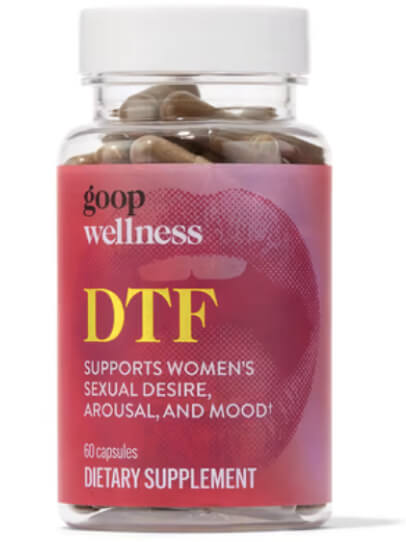

Supported by Science
How to Boost Women’s Libido Naturally
How to Boost Women’s Libido Naturally
By Gerda Endemann, PhD
June 2, 2022
Libido refers to interest in or desire for sex. A holistic approach to a healthy libido—whatever that is for you—takes into account physical, hormonal, psychological, and emotional factors. For example, how can you be in the mood if you are tired or are resentful of your partner? (If the latter rings true, you’ll be interested in some of our stories with therapist Terry Real.)
Although many women report dissatisfaction with some aspect of their sex lives, such as reduced desire, pleasure, or orgasm, most do not talk to health care providers about this or receive treatment. When the subject is brought up, the discussion will most likely revolve around estrogen or testosterone patches, which are worth considering but have their downsides. And the two FDA-approved drugs for libido don’t sound very promising: Addyi, the “little pink pill” for premenopausal women, has been shown to be only minimally helpful in clinical studies. And Vyleesi is a shot that you can give yourself in the belly 45 minutes before sex.
So it’s not surprising that there’s interest in other solutions including talk therapy, mood support, and herbs long valued as aphrodisiacs in traditional Chinese medicine (TCM) and Ayurvedic medicine.
What Are the Best Aphrodisiac Herbs?
Although clinical research on herbs and female libido is not considered conclusive, scientists are studying traditional herbal aphrodisiacs and beginning to figure out how they work. A 2020 review found 40 clinical trials on aphrodisiac effects of herbs on women.
In a typical clinical trial, women are given capsules containing either an herbal extract or a placebo powder to be taken daily for one to two months. The women then fill out questionnaires on multiple aspects of sexual wellness. In addition to querying levels of desire and arousal, studies ask about lubrication, orgasm, satisfaction, and pain—factors that contribute to desire and arousal through a feedback loop.
We’ve listed here some of the most popular herbs and what we know about them from clinical research.
-
Fenugreek seed extract (Trigonella foenum-graecum L.) is grown widely in the Middle East and India. The seeds and leaves are used in foods, and medicinally in Ayurveda and in traditional Persian medicine. The safety of fenugreek seed extract and its value for sexual health have been confirmed by several clinical studies. The extracts contain phytoestrogens, compounds with weak estrogenlike effects such as stimulating collagen production by skin cells.
Libifem® is a branded fenugreek seed extract that has been shown to support healthy sexual arousal and desire in both premenopausal and menopausal women. Further evidence of fenugreek’s benefits was shown in trials of a second branded extract, also in both premenopausal and postmenopausal women.*
Based on fenugreek’s traditional use, and it being the best-studied herb for libido, we formulated DTF with the clinically validated dose of the branded fenugreek seed extract Libifem®. With Libifem® you know that you are getting desirable amounts of the active components, because it’s standardized to contain 50% of the unique furostanol saponins. DTF also contains a clinically studied dose of saffron for mood support (there’s more on saffron below), plus shatavari, an adaptogenic herb to support reproductive health.*
-
Shatavari (Asparagus racemosus) is backed by its longtime use in Ayurvedic medicine for supporting female reproductive health and healthy hormonal balance, which is why we included this ingredient in DTF. It’s also considered to be a powerful rasayana—which means that it supports healthy aging—and an adaptogen that supports a resilient response to stressors. Preliminary research is validating shatavari’s value as an adaptogen and characterizing its many active components—including shatavarins, polyphenols, and alkaloids. For standalone organic shatavari capsules, we like Organic India—whose mission includes supporting bioregenerative agriculture and economic recovery in rural India.*
-
Ashwagandha (Withania somnifera) is another rasayana and adaptogen used in Ayurveda to support a healthy, long life, as well as sexual wellness for both men and women. According to a review article, the Sharangadhara Samhita—an Ayurvedic text from the 13th century—recommends applying ashwagandha root paste “for increasing the size of the penis, also firming the vagina.”
A review of 12 trials concluded that ashwagandha supplementation improves physical performance in men and women. And in agreement with its use in Ayurveda as an aphrodisiac, a clinical study reported significant benefits of an ashwagandha extract for women’s arousal and sexual health. We’ve included a concentrated ashwagandha extract in our new GOOPGLOW multivitamin.
For standalone ashwagandha products, we like the tablet and liquid forms from Planetary Herbals. They are formulated by herbalist Michael Tierra, LAc, OMD, who introduced Ayurvedic herbs to the American natural-products industry in the early 1970s.
-
Ginseng (Asian or Korean red ginseng, Panax ginseng; and American ginseng, Panax quinquefolius) has been used as an aphrodisiac in TCM and Appalachian folk medicine and by Indigenous Americans. Two out of three clinical studies reported benefits for women’s sexual wellness.
-
Tribulus (Tribulus terrestris) is popular in India, Africa, and Indonesia and is considered an aphrodisiac in Ayurveda. While several clinical studies have suggested that it may be helpful for lubrication, only one found benefits for arousal and desire.
-
Dong quai (Angelica sinensis) is used for gynecological health in Ayurveda, TCM, and Western herbalism. It has estrogenic effects that may be beneficial, especially in menopausal women.
-
And others. Horny goat weed has to be included here if only for the name. In TCM and in clinical studies, it’s mostly targeted at male sexual function. Cacao is thought to have been used as an aphrodisiac by the Mayans and Aztecs. In the absence of published studies, cacao is a nice one for self-experimentation. Licorice is said to be an aphrodisiac in the Ratirahasya, an Indian sex manual written in the 11th or 12th century. Maca is widely used in South America, and a clinical trial suggested some benefits for female sexual health. Damiana (T. diffusa) leaf extract has been used as an aphrodisiac historically in the Americas; a damiana liquor is still sold in Mexico for this purpose.
Mood Support and Libido
Supporting a healthy mood is distinct from “being in the mood.” And it’s foundational to sexual wellness. Our most-loved botanical choice for healthy mood support is saffron.
If you are dealing with more than an occasional low mood, this is something to discuss with your health care provider. It’s also important to know that a common side effect of antidepressant medications is reduced libido.
-
Antidepressant medications frequently have libido-squelching side effects including reduced desire and arousal, and difficulty or inability reaching orgasm. Discuss possible side effects of these and other medications with your doctor.
-
Saffron comes to us from Persian traditional medicine. For occasional mood support, DTF contains the dose used in multiple clinical studies that have validated saffron’s benefits. And one of these studies found that it may have additional benefits for sexual health. Active components include crocin, picrocrocin, and safranal, and the clinically studied dose is 30 milligrams of an extract with at least 2% safranal.*
Ways to Naturally Support Vaginal and Vulval Tissues
Healthy vaginal and vulval tissues contribute to pleasure, which in turn feeds libido. Support for healthy tissues can come from hormones (estrogen or DHEA), moisturizers, lubricants, regular sexual activity, diet, and heat.
-
Vitamin D levels are important for healthy vaginal and vulval tissues, and suboptimal vitamin D status is not uncommon, especially if you regularly use sunscreen, have darkly pigmented skin, or don’t expose a good bit of skin to the sun regularly. Even more to the point, giving supplemental vitamin D to women with low levels of vitamin D led to them reporting better desire, arousal, lubrication, and orgasm within four to eight weeks. We like this spray form.
-
Hyaluronic acid is an ingredient in gels and creams used to moisturize and lubricate vaginal and vulval tissues. It’s an ingredient in the lovely lubricant that comes with Tabu’s warming vibrator and in the Photonic Gel recommended for use with the vFit device. The vFit uses heat and red light and is designed to promote sexual function. If you fear that you may not become physically aroused or lubricated—which may be a turnoff for you—I’d recommend regular use of moisturizers and lubricants.
Counseling and Talk Therapy for Libido
Laurie Watson, PhD, licensed marriage and family therapist, writes, “I have never sat with a woman or a couple and not felt hopeful about finding a solution to her low desire and its roots.” This is from Watson’s eminently readable book Wanting Sex Again: How to Rediscover Your Desire and Heal a Sexless Marriage. More from the book: “While a woman may feel that it’s all her fault because she’s the one without desire, nearly all problems with sexual intimacy involve issues brought by both partners.”
Watson and couples therapist George Faller, LMFT, host a podcast called Foreplay Radio – Couples and Sex Therapy. Here’s some insight from Faller from one episode: “The best four-letter word for intimacy is not fuck but talk.” It may be talking about sex, what you fantasize about. Or it may be connecting and feeling heard regarding something else you’re passionate about.
Watson also considers orgasm to play a key role in libido. In her book she writes, “Women need orgasms to have libido.” And “desire kicks in once the body feels something. She wants it once she’s having it.” Watson writes about the importance of taking plenty of time, at least 20 minutes, for transitioning your mindset and becoming aroused. “Once aroused, a woman may take an average of twenty minutes of direct, nonstop, skillful clitoral stimulation to reach orgasm.”
More to Explore on Herbs and Other Ways to Support Libido
Multiple reasons for ups and downs in libido are discussed in “Ask Gerda: What Happens to Libido as We Age?” And there’s more in our interview with Laurie Watson, “Ask a Sex Therapist: Sexuality after Cancer.”
In the book Natural Menopause: Herbal Remedies, Aromatherapy, CBT, Nutrition, Exercise, HRT for Perimenopause, Menopause, and Beyond, medical practitioners and herbalists provide a broad range of approaches to support libido. The body-appreciation scan they lead you through helps you to show gratitude for your body and to connect with all the parts of your body.
And these stories delve into three of our favorite herbs, which you’ll find together in DTF.
Taking Fenugreek Extract for Sexual Arousal and Desire
Libifem® is a registered trademark of Gencor.
*These statements have not been evaluated by the Food and Drug Administration. This product is not intended to diagnose, treat, cure, or prevent any disease.
This article is for informational purposes only. It is not, nor is it intended to be, a substitute for professional medical advice, diagnosis, or treatment and should never be relied upon for specific medical advice. To the extent that this article features the advice of physicians or medical practitioners, the views expressed are the views of the cited expert and do not necessarily represent the views of goop.
We hope you enjoy the products recommended here. Our goal is to suggest only things we love and think you might, as well. We also like transparency, so, full disclosure: We may collect a share of sales or other compensation if you purchase through the external links on this page.


